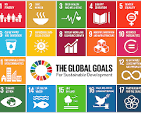The Meaning of Sustainable Development Goals
Sustainable Development Goals (SDGs) are a set of global objectives established by the United Nations to address various social, economic, and environmental challenges facing the world today. These goals aim to promote sustainable development in all countries, ensuring that progress is made in a way that is inclusive, equitable, and environmentally friendly.
Key Aspects of Sustainable Development Goals
The SDGs cover a wide range of issues, including poverty eradication, quality education, gender equality, clean water and sanitation, affordable and clean energy, sustainable cities and communities, climate action, and more. There are 17 goals in total, each with specific targets to be achieved by 2030.
Importance of Sustainable Development Goals
The SDGs provide a roadmap for countries and organisations to work towards a more sustainable future. By addressing interconnected challenges such as poverty, inequality, and environmental degradation simultaneously, the SDGs promote a holistic approach to development that considers the well-being of both present and future generations.
Achieving Sustainable Development Goals
Meeting the SDGs requires collaboration at all levels – from governments and businesses to civil society and individuals. It involves making changes in policies, practices, and behaviours to ensure that development is not only economically viable but also socially just and environmentally sound.
Conclusion
Sustainable Development Goals represent a shared vision for a better world. By working together to achieve these goals, we can create a more prosperous, inclusive, and sustainable future for all. It is through collective action and commitment that we can turn the aspirations outlined in the SDGs into reality.
6 Ways to Engage with the United Nations’ Sustainable Development Goals
- Understand the 17 Sustainable Development Goals (SDGs) set by the United Nations
- Educate others about the importance of sustainable development and its impact on society
- Promote responsible consumption and production practices in your daily life
- Support initiatives that aim to reduce inequality, poverty, and environmental degradation
- Advocate for policies that address climate change and protect ecosystems
- Collaborate with local communities and organisations to work towards achieving the SDGs
Understand the 17 Sustainable Development Goals (SDGs) set by the United Nations
Understanding the 17 Sustainable Development Goals (SDGs) set by the United Nations is crucial for fostering global progress towards a more sustainable and equitable future. These goals encompass a wide range of interconnected issues, from poverty alleviation to climate action, aiming to address the most pressing challenges of our time. By familiarising ourselves with the SDGs, we can align our efforts and initiatives with this universal agenda, contributing to a collective endeavour towards a more prosperous and sustainable world for all.
Educate others about the importance of sustainable development and its impact on society
Educating others about the significance of sustainable development and its influence on society is crucial in fostering a collective understanding and commitment towards creating a more sustainable future. By raising awareness about the interconnectedness of social, economic, and environmental aspects of development, individuals can be empowered to make informed choices that contribute to positive change. Through education, we can inspire action, promote responsible behaviours, and ultimately work towards achieving the Sustainable Development Goals for a more equitable and thriving world for all.
Promote responsible consumption and production practices in your daily life
Promoting responsible consumption and production practices in your daily life is a crucial step towards supporting the Sustainable Development Goals. By being mindful of the products you use, the resources you consume, and the waste you generate, you can contribute to a more sustainable future. This can involve choosing products with minimal packaging, opting for reusable items over disposable ones, and reducing food waste by planning meals efficiently. Small changes in our daily habits can have a significant impact on promoting a more sustainable and environmentally friendly lifestyle.
Support initiatives that aim to reduce inequality, poverty, and environmental degradation
Supporting initiatives that aim to reduce inequality, poverty, and environmental degradation is crucial in advancing the Sustainable Development Goals. By backing such efforts, we contribute to building a more equitable society where everyone has access to opportunities and resources. Addressing these interconnected issues not only improves the well-being of individuals but also helps protect our planet for future generations. It is through collective action and support for sustainable initiatives that we can make meaningful progress towards a more just and sustainable world.
Advocate for policies that address climate change and protect ecosystems
Advocating for policies that address climate change and protect ecosystems is crucial in achieving the Sustainable Development Goals. By pushing for regulations and initiatives that reduce greenhouse gas emissions, promote renewable energy sources, and preserve biodiversity, we can contribute to a more sustainable future for our planet. These efforts not only help mitigate the impacts of climate change but also safeguard vital ecosystems that provide essential services to both humans and wildlife. It is through proactive advocacy and policy-making that we can make a meaningful impact on the environment and work towards a more resilient and balanced world.
Collaborate with local communities and organisations to work towards achieving the SDGs
Collaborating with local communities and organisations is crucial in working towards achieving the Sustainable Development Goals (SDGs). By engaging with grassroots organisations, community leaders, and local residents, we can ensure that development efforts are aligned with the specific needs and priorities of each region. This collaborative approach not only fosters a sense of ownership and empowerment within communities but also leads to more effective and sustainable outcomes. Through partnership and dialogue, we can harness the collective knowledge, resources, and expertise of all stakeholders to drive progress towards a more equitable and prosperous future for all.
